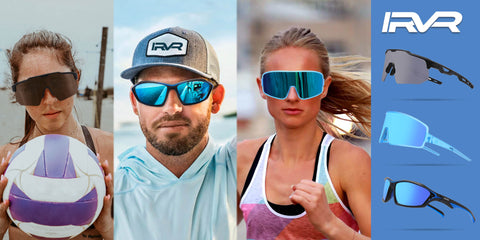What Does Polarized Sunglasses Mean?
With the increasing demand for eyes' protection, polarized sunglasses are emerging out in our daily life, and are becoming increasingly popular due to their numerous benefits.The polarized sunglasses of coursly brought many questions, and the first one is what does polarized sunglasses mean? and what dooes polarization mean to eyes protection? Generally Polarized sunglasses can do a lot to enhance your visual experience and protect your eyes in various situations. This article will guide you know what exactly they are, and how do polarized sunglasses work for you.
Table of Contents
1. What Does Polarization Mean in Sunglasses?
2. What Do Polarized Lenses Do? 6 Main Characters of the Polarized Sunglasses
What Does Polarization Mean in Sunglasses?
In the context of sunglasses, polarization refers to a specific feature of the lenses that helps reduce glare and improve visual clarity. Polarization is achieved through a special chemical coating applied to the lenses.
When light reflects off surfaces like water, snow, or roads, it often becomes horizontally polarized, resulting in intense glare. Polarized lenses are designed to block this horizontally polarized light, allowing only vertically polarized light to pass through. This selective filtering process effectively reduces glare and enhances vision.

The polarization coating consists of aligned molecules that act as microscopic filters. These molecules block the horizontally polarized light waves while allowing vertically polarized light to pass through the lens. As a result, the lenses significantly reduce glare from reflective surfaces, making them ideal for activities like fishing, boating, driving, or any outdoor situation where glare can be a problem.
By eliminating or minimizing glare, polarized sunglasses improve visual comfort, reduce eye strain, and enhance clarity and detail perception. They also provide added protection against harmful ultraviolet (UV) rays, as many polarized lenses offer built-in UV protection.
What Do Polarized Lenses Do? 6 Main Characters of the Polarized Sunglasses
After known what does polarized sunglasses mean, we shall learn what do polarized lenses do for you, and when to use polarized sunglasses.
1.Reduce Glare: Polarized lenses effectively reduce glare caused by reflected light from surfaces such as water, snow, sand, or roads. Glare can be distracting and uncomfortable, but polarized lenses help filter out the horizontally polarized light that causes it, resulting in a clearer and more comfortable view.
2.Improve Visual Clarity: By reducing glare, polarized lenses enhance visual clarity and sharpness. They can make objects and details appear more defined and easier to see, especially in bright outdoor conditions.
3.Enhance Contrast: Polarized lenses increase the contrast between objects and their backgrounds, making them stand out more clearly. This improved contrast can be particularly beneficial for activities such as driving, sports, and outdoor adventures where precise vision is crucial.
4.Provide UV Protection: Many polarized lenses offer built-in UV protection, blocking harmful ultraviolet (UV) rays from the sun. This helps safeguard your eyes from potential long-term damage caused by UV radiation, including cataracts and macular degeneration.
5.Reduce Eye Strain: By eliminating glare and providing clearer vision, polarized lenses can help reduce eye strain and fatigue, especially during prolonged outdoor activities or in bright environments.
6.Enhance Color Perception: Polarized lenses can enhance color perception by reducing the intensity of certain wavelengths of light. This can result in more vibrant and true-to-life colors, allowing you to enjoy the beauty of your surroundings.
When to Use Polarized Sunglasses?
Polarized sunglasees users all feel less tired than using other sunglasses Through long hours outdoor activities under sun glare. They can actually be used in many fields, let me tell you when to use polarized sunglasses:

Fishing: Polarized sunglasses are highly valued by fishermen because they significantly reduce glare on the water's surface. Glare hampers visibility and makes it difficult to see below the water's surface, where fish may be hiding. By minimizing glare, polarized lenses enable anglers to observe fish, underwater structures, and changes in water color more effectively, enhancing their chances of a successful catch.
Boating: Spending extended periods on the water can strain your eyes due to the bright sunlight and reflected glare. Polarized sunglasses alleviate this eyestrain by reducing the intensity of reflected light from the water's surface. Additionally, they enhance visibility below the waterline, which is crucial when operating a boat and navigating safely.
Golfing: Polarized sunglasses are a matter of personal preference among golfers. While some golfers believe that polarized lenses can make it challenging to read greens accurately, studies have yielded inconsistent results on this matter. However, many golfers find that polarized sunglasses effectively minimize glare on fairways, helping them track the ball's flight path more easily. Moreover, polarized lenses can aid in locating golf balls in water hazards, improving their visibility against the glare.
Snowy environments: Polarized sunglasses are highly recommended in snowy environments. Snow reflects sunlight, resulting in intense glare that can strain the eyes and reduce visibility. By wearing polarized sunglasses, the glare is significantly diminished, providing better visual comfort and clarity. However, it's important to note that polarized sunglasses may not be suitable for certain snow-related activities that require distinguishing between ice and water, as the polarization effect can affect color perception.
When Should You Not Use Polarized Sunglasses?
1.Viewing LCD screens: Polarized lenses can interfere with the visibility of LCD screens, such as those found on some vehicle dashboards, GPS devices, or digital screens. The polarization effect may cause the screens to appear distorted or even become completely invisible. In such cases, it's recommended to remove polarized sunglasses or use non-polarized ones to ensure clear screen visibility.
2.Skiing or snowboarding: In snow sports, it's important to differentiate between ice and water patches on the slopes. Polarized sunglasses can affect depth perception and color recognition, potentially making it harder to distinguish between these variations in snow conditions. Non-polarized sunglasses or specialized goggles with specific lens tints for snow sports may be a better choice.

3.Flying: Pilots and aviation professionals generally avoid using polarized sunglasses because they can interfere with the visibility of certain instruments and screens inside the aircraft cockpit. Similar to the LCD screen issue, polarized lenses can create distortion or reduce the clarity of these displays, impacting safety and readability.
4.Indoor activities: Polarized sunglasses are primarily designed for outdoor use in bright environments with intense glare. In indoor settings, such as shopping malls, restaurants, or regular office spaces, there is usually no significant glare to block or reduce. Therefore, wearing polarized sunglasses indoors may not provide any substantial benefit and could even dim the overall visual experience.
Conlusion
All in all, we have known ""what does polarized sunglasses mean?"", it can serve eye protection from sun glare, and blocks harmful ultraviolet (UV) rays from the sun. And they are great tools to enhance visual clarity in activities like fishing, boating, golfing, and so on. If you want to purchase good quality polarized sunglasses, you can absolutely choose RVR, who provides top-quality polarized sunglasses that can withstand the demands of sports.

